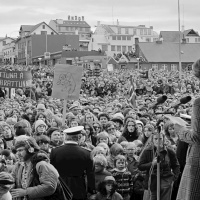#HotDocs19: First Set of Capsule Reviews
By John Corrado
The 2019 Hot Docs Film Festival runs from April 26th to May 6th in Toronto, more information on tickets and showtimes can be found right here.
In My Blood It Runs – ★★★½ (out of 4)
Dujuan is a 10-year-old Aboriginal Australian boy of Arrernte descent who lives in Mparntwe (Alice Springs), and is being raised by his single mother and grandmother, who is trying to teach him how to speak the traditional Indigenous languages and become a healer. But at school, he is being given a white-washed education and his failing grades are causing him to act out and lose confidence. While he has an outlet for his hyperactivity and restless energy during family road trips to the bush, the classroom is the wrong place for him and the teachers do little to truly help or support him.
Dujuan’s poor attendance at school and increasingly reckless behaviour increase the threat that he will be put in a cruel youth detention centre, where a shocking one hundred percent of the detainees are Aboriginal. Directed by Maya Newell, who made the film with the full participation of Dujuan’s family, In My Blood It Runs is an engaging and moving portrait of a young boy stuck between his traditional way of life and a modern, westernized society that is at risk of failing him. The film is beautifully shot, with Newell giving Dujuan a camera to document some of his experiences through his own eyes, giving us an authentic and respectful glimpse into a world and culture that we don’t normally see.
Friday, April 26th – 6:15 PM at TIFF Bell Lightbox 2
Sunday, April 28th – 12:30 PM at Scotiabank Theatre 4
Saturday, May 4th – 6:15 PM at TIFF Bell Lightbox 3
On the Inside of a Military Dictatorship – ★★★ (out of 4)
Aung San Suu Kyi spent years imprisoned in Burma for trying to bring democracy to Myanmar, as the government was taken over by a military dictatorship in 1989, and she received a Nobel Peace Prize for her efforts. After being released, she was finally able to rise to power after her party secured a landslide victory in the country’s 2015 election. Despite a clause that was added to the Constitution to prevent her from ever officially becoming president, the military government transferred power over to her, forcing her to work alongside many of the same people who for years supported her imprisonment.
But Aung San Suu Kyi’s leadership, which was initially seen as a powerful rebuttal of authoritarianism, became much more complicated in the midst of the military’s 2016 genocide of Myanmar’s Royhinga Muslim population, with her inadequate response to the ethnic cleansing drawing her condemnation from the UN and other world leaders. With striking access to a variety of key governmental figures from both sides of the aisle, filmmaker Karen Stokkendal Poulsen documents a good chunk of the country’s complex history in On the Inside of a Military Dictatorship, offering a dense and fascinating inside look at the political machinations of Burma over the past several decades. Divided into chapters, Poulsen’s narration provides added insight, keeping us engaged despite the challenging nature of the material.
Friday, April 26th – 8:15 PM at TIFF Bell Lightbox 4
Sunday, April 28th – 12:15 PM at Hart House Theatre
Thursday, May 2nd – 12:15 PM at Scotiabank Theatre 3
Maxima – ★★★ (out of 4)
Máxima Acuña is a farmer in the Peruvian Highlands who assumed the role of fierce political activist when she took the Newmont Mining Corporation, an American company planning to expands their operations in the area and take over her land to mine for gold, to court. While the project would bring economic opportunities to the area, the environmental impacts will be devastating. The mining project would not only destroy her land, but the chemicals used in the gold mining process will also pollute the life-giving water supply, making the area essentially uninhabitable.
Director Claudia Sparrow documents Máxima’s attempts to save her land and livelihood from powerful corporate interests, despite facing an uphill battle that includes intimidation tactics used to try and force her off the land, ranging from physical assaults to the destruction of her crops. It’s not just about saving this plot of land, but also about preserving a way of life. Máxima is a feisty and inspiring protagonist, and the film is wrought with the push and pull between a traditional way of life and modern developments that threaten to destroy it.
Saturday, April 27th – 5:45 PM at Isabel Bader Theatre
Sunday, April 28th – 10:30 AM at TIFF Bell Lightbox 2
Sunday, May 5th – 3:30 PM at Isabel Bader Theatre
On the President’s Orders – ★★★½ (out of 4)
When he was elected president in 2016, Rodrigo Duterte promised to clean up the streets by declaring war upon all drug dealers and users in the Phillipines. This included giving police permission to shoot people on site if they were found in possession of any amount of drugs, leading to over three thousand deaths in the first year alone, with the country’s poorest citizens often being the hardest hit by these policies. In On the President’s Orders, directors James Jones and Olivier Sarbill put us on the ground with both the citizens and police officers as the Special Operations Unit, under the guidance of their ruthless new chief Jemar Modequillo, focus their investigation on the Caloocan district of Manila.
Playing like a real life thriller, On the President’s Orders powerfully documents what happens when a militarized police department is allowed to act without immunity and little fear of being penalized for their actions. The film explores how the officers are able to justify what they are doing, and the effects that Duterte’s literal drug war is having upon the citizens, with both sides opening themselves up to the camera. At 72 minutes long, On the President’s Orders is a short and forceful film that unfolds like watching a glimpse into a real life dystopia.
Saturday, April 27th – 8:30 PM at Scotiabank Theatre 3
Monday, April 29th – 3:15 PM at Scotiabank Theatre 4
Sunday, May 5th – 3:00 PM at Hart House Theatre
The Day Don Died – ★★★ (out of 4)
The residents of the Performing Arts Lodge in Vancouver, an affordable apartment building for retired performing artists, got a Good Friday shock when they heard that their beloved friend and neighbour, a singer by the name of Don Stewart, had passed away, with them all sharing conflicting accounts of how it happened. What they weren’t expecting was a modern day “miracle” of sorts on Easter Monday. Directed by Steve J. Adams and Sean Horlor, The Day Don Died is a short that was produced with the support of TELUS as part of their STORYHIVE initiative. At around fourteen minutes long, it’s a neat and tidy little film that shares what amounts to an amusing anecdote, while using it as the jumping off point for a brief discussion of “fake news” and how we shouldn’t just believe everything we hear without question.
Saturday, April 27th – 9:00 PM at Scotiabank Theatre 4 (screening with Backstage Action)
Sunday, April 28th – 8:15 PM at Innis Town Hall (screening with Backstage Action)
Inside Lehman Brothers – ★★½ (out of 4)
The 2008 financial crisis had a devastating effect on families who lost their homes to foreclosure, but what’s less well documented is the toll that the economic downturn had upon the employees at Lehman Brothers who saw the tide turning and tried to warn the investment bank about the dangers of subprime mortgages, risking their jobs and personal safety in the process. Director Jennifer Deschamps follows a selection of mostly female former employees in her documentary Inside Lehman Brothers, including the account executive turned whistleblower Sylvia Vega-Sutfin, who still fears for her life, having learned self defence and open carrying in case she needs to defend herself.
The film’s most interesting and startling scenes come when these women recount the sexual harassment that they received from their male bosses, who tried to intimidate them into staying silent. The subject matter is interesting, and the interviews do shed some interesting light on the financial crisis from an angle that hasn’t really been explored before. But the execution of the film could have been better, and Deschamps opts for an overbearing score and a faux thriller aesthetic at times that doesn’t really work, trying to drum up suspense in an otherwise somewhat dry film.
Saturday, April 27th – 9:30 PM at TIFF Bell Lightbox 1
Sunday, April 28th – 1:30 PM at Hot Docs Ted Rogers Cinema
Friday, May 3rd – 6:15 PM at TIFF Bell Lightbox 1
For Sama – ★★★ (out of 4)
Shot over five years, and assembled like a video diary for her young daughter Sama, Waad Al-Kateab’s documentary For Sama offers an invaluable portrait of the brutal conflict in the Syrian city of Aleppo from the perspective of a young mother. The start of the Syrian revolution in 2011 prompted Al-Kateab, who was a student at the University of Aleppo at the time, to pick up a camera and start documenting the increasing protests against Bashar al-Assad’s government. Sama was born shortly after, and she became a silent observer to Assad’s successful attempts to retake the once rebel-held city of Aleppo through military force, causing the citizens to live in constant fear of airstrikes from both Assad’s regime and Russian forces who are backing the Syrian government.
As the hospitals are bombed and houses destroyed, Al-Kateab and her husband Hamza, a doctor who is on the front lines treating those who are injured in the attacks, struggle with whether they should stay in Aleppo and continue fighting for freedom, or leave the city for good for the sake of their daughter. With Al-Kateab’s camera capturing the carnage directly as it unfolds, lingering over haunting images of blood-soaked hospital floors and the mangled bodies of children who have been killed in the blasts, For Sama is harrowing and often heartbreaking to watch. But if you can handle the extreme content, it provides a powerful and important look at the realities of life in Aleppo during the first five years of the Syrian revolution, through the eyes of a family just trying to provide a better life for their daughter.
Monday, April 29th – 9:00 PM at TIFF Bell Lightbox 3
Tuesday, April 30th – 12:30 PM at Hart House Theatre
Sunday, May 5th – 12:45 PM at TIFF Bell Lightbox 3
The Corporate Coup D’État – ★★★ (out of 4)
Back in 1995, Canadian philosopher John Ralston Saul came up with the term “corporate doup d’état” to describe the American government as being in the midst of a slow-moving takeover by corporations who are influencing public policy for their own self interests. This is the basis of director Fred Peabody’s film The Corporate Coup D’État, which looks at how the American government has been functioning under the influence of high-powered lobbyists for decades now. The increasing rollbacks of regulations that started under Ronald Reagan and Bill Clinton have allowed corporations to turn more of a profit on the backs of workers, as unfair trade deals like NAFTA caused companies to maximize profit by moving the majority of manufacturing jobs to Mexico and China, putting countless Americans out of work.
Many of the journalists, authors and philosophers interviewed in the film argue that, while Donald Trump was elected as a populist hero to the American workers who promised to bring their jobs back, his administration is actually beholden to corporations who have benefitted the most from his policies, which is an argument that we have mostly heard before. But when the film dispenses with its intellectual talking heads and instead interviews displaced workers in once booming but now desecrated former manufacturing towns like Camden, New Jersey and Youngstown, Ohio who actually supported Trump, many of them former Democrats who voted for Barack Obama twice and backed Bernie Sanders during the primaries, it becomes much more nuanced and interesting. Through their eyes, we see that Trump was merely a desperate reaction to the failed neoliberalism of Obama, who ran on a campaign of hope and change but failed to deliver it in a meaningful way, leaving voters feeling cynical and wanting to upend the status quo.
These sections of The Corporate Coup D’État are quite powerful, but the trouble is that the film can also feel guilty of the same sort of elitist finger-wagging that voters were rejecting when they cast their ballots for Trump, with the repetitive and largely reductionist arguments that some of the subjects make about people supporting him for “racist” or “sexist” reasons adding little to the overarching narrative about the displacement of the working class. But Peabody has still managed to deliver an engaging and well made portrait of the devastating effects of corporatism upon middle America, using clips from prophetic films like Network, Wall Street and The Distinguished Gentleman to drive home his point.
Monday, April 29th – 9:30 PM at Hot Docs Ted Rogers Cinema
Tuesday, April 30th – 10:00 AM at Isabel Bader Theatre
Friday, May 3rd – 12:00 PM at Hart House Theatre


















